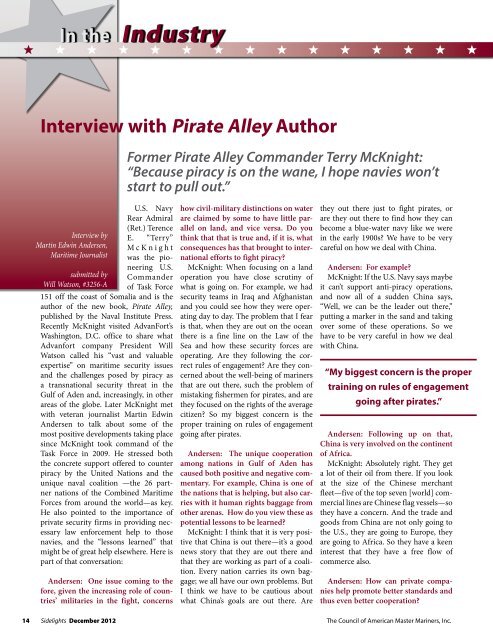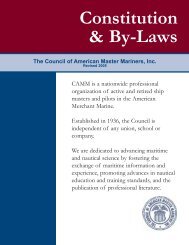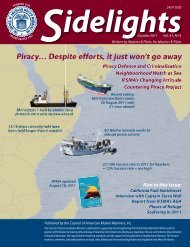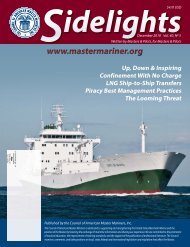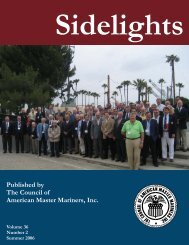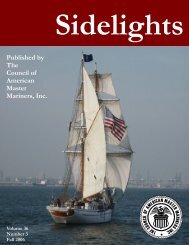Membership In the - Council of American Master Mariners
Membership In the - Council of American Master Mariners
Membership In the - Council of American Master Mariners
You also want an ePaper? Increase the reach of your titles
YUMPU automatically turns print PDFs into web optimized ePapers that Google loves.
<strong>In</strong> <strong>the</strong><br />
<strong>In</strong>terview by<br />
Martin Edwin Andersen,<br />
Maritime Journalist<br />
submitted by<br />
Will Watson, #3256-A<br />
<strong>In</strong>dustry<br />
<strong>In</strong>terview with Pirate Alley Author<br />
Former Pirate Alley Commander Terry McKnight:<br />
“Because piracy is on <strong>the</strong> wane, I hope navies won’t<br />
start to pull out.”<br />
U.S. Navy<br />
Rear Admiral<br />
(Ret.) Terence<br />
E. “Terry”<br />
McKnight<br />
was <strong>the</strong> pioneering<br />
U.S.<br />
Commander<br />
<strong>of</strong> Task Force<br />
151 <strong>of</strong>f <strong>the</strong> coast <strong>of</strong> Somalia and is <strong>the</strong><br />
author <strong>of</strong> <strong>the</strong> new book, Pirate Alley,<br />
published by <strong>the</strong> Naval <strong>In</strong>stitute Press.<br />
Recently McKnight visited AdvanFort’s<br />
Washington, D.C. <strong>of</strong>fice to share what<br />
Advanfort company President Will<br />
Watson called his “vast and valuable<br />
expertise” on maritime security issues<br />
and <strong>the</strong> challenges posed by piracy as<br />
a transnational security threat in <strong>the</strong><br />
Gulf <strong>of</strong> Aden and, increasingly, in o<strong>the</strong>r<br />
areas <strong>of</strong> <strong>the</strong> globe. Later McKnight met<br />
with veteran journalist Martin Edwin<br />
Andersen to talk about some <strong>of</strong> <strong>the</strong><br />
most positive developments taking place<br />
since McKnight took command <strong>of</strong> <strong>the</strong><br />
Task Force in 2009. He stressed both<br />
<strong>the</strong> concrete support <strong>of</strong>fered to counter<br />
piracy by <strong>the</strong> United Nations and <strong>the</strong><br />
unique naval coalition —<strong>the</strong> 26 partner<br />
nations <strong>of</strong> <strong>the</strong> Combined Maritime<br />
Forces from around <strong>the</strong> world—as key.<br />
He also pointed to <strong>the</strong> importance <strong>of</strong><br />
private security firms in providing necessary<br />
law enforcement help to those<br />
navies, and <strong>the</strong> “lessons learned” that<br />
might be <strong>of</strong> great help elsewhere. Here is<br />
part <strong>of</strong> that conversation:<br />
Andersen: One issue coming to <strong>the</strong><br />
fore, given <strong>the</strong> increasing role <strong>of</strong> countries’<br />
militaries in <strong>the</strong> fight, concerns<br />
how civil-military distinctions on water<br />
are claimed by some to have little parallel<br />
on land, and vice versa. Do you<br />
think that that is true and, if it is, what<br />
consequences has that brought to international<br />
efforts to fight piracy?<br />
McKnight: When focusing on a land<br />
operation you have close scrutiny <strong>of</strong><br />
what is going on. For example, we had<br />
security teams in Iraq and Afghanistan<br />
and you could see how <strong>the</strong>y were operating<br />
day to day. The problem that I fear<br />
is that, when <strong>the</strong>y are out on <strong>the</strong> ocean<br />
<strong>the</strong>re is a fine line on <strong>the</strong> Law <strong>of</strong> <strong>the</strong><br />
Sea and how <strong>the</strong>se security forces are<br />
operating. Are <strong>the</strong>y following <strong>the</strong> correct<br />
rules <strong>of</strong> engagement? Are <strong>the</strong>y concerned<br />
about <strong>the</strong> well-being <strong>of</strong> mariners<br />
that are out <strong>the</strong>re, such <strong>the</strong> problem <strong>of</strong><br />
mistaking fishermen for pirates, and are<br />
<strong>the</strong>y focused on <strong>the</strong> rights <strong>of</strong> <strong>the</strong> average<br />
citizen? So my biggest concern is <strong>the</strong><br />
proper training on rules <strong>of</strong> engagement<br />
going after pirates.<br />
Andersen: The unique cooperation<br />
among nations in Gulf <strong>of</strong> Aden has<br />
caused both positive and negative commentary.<br />
For example, China is one <strong>of</strong><br />
<strong>the</strong> nations that is helping, but also carries<br />
with it human rights baggage from<br />
o<strong>the</strong>r arenas. How do you view <strong>the</strong>se as<br />
potential lessons to be learned?<br />
McKnight: I think that it is very positive<br />
that China is out <strong>the</strong>re—it’s a good<br />
news story that <strong>the</strong>y are out <strong>the</strong>re and<br />
that <strong>the</strong>y are working as part <strong>of</strong> a coalition.<br />
Every nation carries its own baggage;<br />
we all have our own problems. But<br />
I think we have to be cautious about<br />
what China’s goals are out <strong>the</strong>re. Are<br />
<strong>the</strong>y out <strong>the</strong>re just to fight pirates, or<br />
are <strong>the</strong>y out <strong>the</strong>re to find how <strong>the</strong>y can<br />
become a blue-water navy like we were<br />
in <strong>the</strong> early 1900s? We have to be very<br />
careful on how we deal with China.<br />
Andersen: For example?<br />
McKnight: If <strong>the</strong> U.S. Navy says maybe<br />
it can’t support anti-piracy operations,<br />
and now all <strong>of</strong> a sudden China says,<br />
“Well, we can be <strong>the</strong> leader out <strong>the</strong>re,”<br />
putting a marker in <strong>the</strong> sand and taking<br />
over some <strong>of</strong> <strong>the</strong>se operations. So we<br />
have to be very careful in how we deal<br />
with China.<br />
“My biggest concern is <strong>the</strong> proper<br />
training on rules <strong>of</strong> engagement<br />
going after pirates.”<br />
Andersen: Following up on that,<br />
China is very involved on <strong>the</strong> continent<br />
<strong>of</strong> Africa.<br />
McKnight: Absolutely right. They get<br />
a lot <strong>of</strong> <strong>the</strong>ir oil from <strong>the</strong>re. If you look<br />
at <strong>the</strong> size <strong>of</strong> <strong>the</strong> Chinese merchant<br />
fleet—five <strong>of</strong> <strong>the</strong> top seven [world] commercial<br />
lines are Chinese flag vessels—so<br />
<strong>the</strong>y have a concern. And <strong>the</strong> trade and<br />
goods from China are not only going to<br />
<strong>the</strong> U.S., <strong>the</strong>y are going to Europe, <strong>the</strong>y<br />
are going to Africa. So <strong>the</strong>y have a keen<br />
interest that <strong>the</strong>y have a free flow <strong>of</strong><br />
commerce also.<br />
Andersen: How can private companies<br />
help promote better standards and<br />
thus even better cooperation?<br />
14 Sidelights December 2012 The <strong>Council</strong> <strong>of</strong> <strong>American</strong> <strong>Master</strong> <strong>Mariners</strong>, <strong>In</strong>c.


